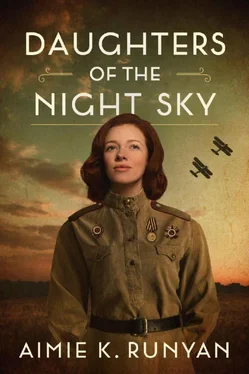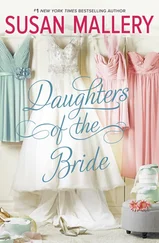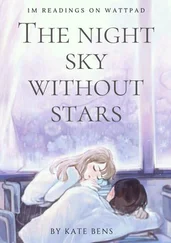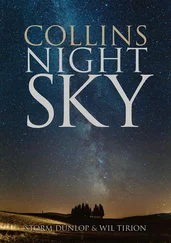Vanya worked in silence for over an hour, but I was so transfixed and he worked so intently that the time swept past.
“You can move now,” he said at length. “I still have some shading to do, the landscape to fill in, but you can get up.”
I stood, stiff from the long sitting, and circled around to see what he had produced.
“That’s not me,” I said as he played with the texture of the grass on the edges of the portrait. The woman had a proud chin, her expression defiant. She was beautiful.
“You offend me,” he said without looking up. “You don’t think I have the skill to capture your likeness?”
“It’s a lovely painting,” I said. It was true. The color was remarkable, the texture so vivid I longed to touch it. “I just don’t think you painted me.”
“It’s very much you. You just can’t see yourself the way I do.” He glanced over at me and back to the canvas, his brow furrowed.
“I had no idea you were so talented,” I said, keeping my blush at bay, though only just. “You ought to be studying painting instead of how to fly a plane.”
“The son of Antonin Solonev does not study art. He studies war,” Vanya said in a voice that was not his own, obviously quoting his father.
“I thought you weren’t one for tradition,” I said, placing my hand on his shoulder. Was it too bold? “Following your papa’s orders certainly qualifies as that.”
“He’s a hard man to ignore.” His strokes grew short and furious, the bristles scratching against the canvas like dry pine needles as he added one last flourish of pale yellow to highlight where the sunlight bounced off the red of my hair. “But to own the truth, I’m glad he pushed me. The war is coming, and I’ll be better off in the air than in a trench.”
“Let’s hope the peace treaty stands and we avoid the worst of it.” I clung to that piece of paper like a life preserver, but each time I said it, it sounded more and more feeble.
“I’m not used to such optimism from you,” he chuckled, at last taking his eyes off the canvas. “And I’m afraid it’s wishful thinking.”
“And far too nice a day to worry about such things when we don’t have to.”
“True, and now you owe me a display of your talents. Take out your violin and play for me, Katyushka.”
I blushed at the endearment and thought of Mama, her eyes weary after a day at the laundry, sitting back in her chair. “Play for me, Katinka,” she would urge me. It gave Mama a few moments of pleasure, and I found there was no better motivation to practice.
I obliged him, pulling Papa’s violin from its case, grateful I’d been able to scrape together the funds for new strings. Usually I favored Papa’s mournful folk tunes, but today wasn’t a day for tears. Nor did I feel equal to a giddy tune for dancing. My repertoire wasn’t vast, but I opted for a short ballad that was wistful, bittersweet, but one that always filled me with hope.
“You have skill,” Vanya said as I lowered my bow.
“Not as much as I would like, but I don’t have much time for practicing.”
“I understand that.” He cast a glance at his painting, his brow furrowing yet again. A wayward brushstroke? A poorly chosen shade? He was a pilot; that he was a perfectionist was no shock to me.
“The best light is nearly shot,” he said, gazing into the sky. “I can steal odd moments in the dormitory to finish it up. Perhaps your mother would enjoy it when it’s finished? I can’t very well hang it next to my bunk. Half the time I just paint over my old canvases, but I’m partial to this one.”
“God, no,” I muttered, imagining the reaction to the display of my portrait in the men’s barracks. “Your bunkmates can’t see it. I’d never hear the end of it.”
“I’ll be careful, I promise.” His hand took mine for a moment, then dropped it just as quickly. “So should I send it to your mother?”
“I’m sure Mama would love to have it.” The painting would stand out in our shabby old cabin like a ruby necklace on a coal miner, but I would not embarrass him or my mother by saying so. It was a beautiful thing, and my mother could do with more beauty in her life.
“Excellent,” he said, and packed away his easel. He protected the wet canvas by attaching it to another with little hand screws. Like so much in Vanya’s life, it was all so well ordered and meticulously planned. I envied this, for so much of my life had been determined by circumstance rather than choice.
“Thank you, by the way,” he said once his equipment was sorted. He took a seat next to me on the blanket, watching as the sun dipped behind the trees.
“Whatever for?”
“For letting me paint you. I’ve been wanting to for some time. The first time I saw you was after one of your practice runs. The sunset caught the glint of your auburn hair. I knew I had to capture it on canvas.” He tucked a finger under my chin, drawing my lips to his.
Mama’s cautionary tales, Taisiya’s warnings—all drowned by a single kiss.
I leaned in, allowing him to wrap his strong arms around me and drink more deeply from my lips. When he pulled away, I could see his dark eyes scan my face, assessing my reaction.
“I’ve been wanting to do that from just about the same time,” he admitted, leaning his forehead against mine. His embrace was like a down comforter on a winter morning, and for once I wanted to ignore chores, lessons, and duty and have a morning to luxuriate in it.
“I’ve tried not to think of you that way,” I said, finally pulling away to see his face. “I couldn’t afford the distraction.” I winced as the word tumbled from my lips.
“‘My distraction.’ That will never be my favorite endearment, but I’ve been called worse,” he said through a chuckle. He stood, offering me his hand. “I’ve had enough of the mess hall. Perhaps for a lifetime. Let’s have supper in town, shall we?”
“And who knows how long we’ll be confined to army rations after this?” I said, lacing my fingers in his and pulling my wrap closer against the rapidly cooling night air.
“Too right, but no more of the world tonight, Katyushka.”
We detoured to the barracks to stow the art supplies and violin, thankfully going unnoticed as everyone was eating in the mess hall, and continued hand in hand into town. The sun wouldn’t set fully for hours yet, we being so far to the north, but the evening light was reedy and feeble, somehow not quite sincere about illuminating our path.
I had never ventured inside an establishment more refined than one of the public houses near the academy that served a respectable ukha , where I went when I was homesick for my mother’s good fish soup. Vanya didn’t have his eyes on one of the loud taverns full of factory workers but rather directed us toward one of the smart restaurants that had sprung up to attend to the heads of industry, visiting officials, and important guests. The décor looked lavish to my untrained eyes. Dark wood and pristine white tablecloths. Low candles encased the room in a soft glow. I didn’t need to look at the menu to know I couldn’t hope to afford a meal here.
“I’m not terribly hungry,” I said. “Maybe we could go to a little pub instead?” He would insist upon paying, and I didn’t want to be indebted to him any more than I was.
“Nonsense,” Vanya replied, placing a bill in the hand of the maître d’ as he showed us to our table. A crisply dressed waiter scuttled over, looking as though nothing were more important in his world than Vanya’s next command.
“We’ll have the lamb pelmeni, roasted potatoes, and two lagers,” he said to the waiter. Lamb dumplings and crisp beer. Rich and savory, but nothing too exotic. “My treat,” he said softly as the waiter scurried off to the kitchen.
Читать дальше












